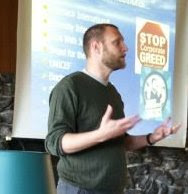A Lovesong
Anyone who walks away from reading the Bible with less than a conviction for social justice, peace and mercy, hasn't read enough.
That's how I feel coming off this week's lectionary scripture from Isaiah.
Isaiah paints us a picture - an object lesson, if you will - in the voice of God. God has great hopes and plants a vineyard on a hill of fertile soil. The vintner removes all the stones, plants the finest vines, and is so confident of the glorious harvest to come the gardener builds ("hews") a wine press. This is truly a love song.
But the love turns sour.
The vines do not yield choice grapes, but wild grapes - unsuitable for cultivation and useless for good wine-making. At any rate, they aren't what the Vintner was hoping and working for. Something has gone terribly wrong.
Isaiah expresses God's disappointment as the destruction of wrathful vengeance, as a clearing-away of the garden, as the Gardener's abandonment of the garden to the threats of the wild.
But the threat of imminent doom stands only to emphasize the source of God's disappointment: God expects fairness among the people, and finds only injustice (NRSV: "bloodshed"); expects righteousness, but finds only cries of distress. The people's failure to live a zionic lifestyle, to live in right relationship with each other, to treat each other and foreigners with compassion and fairness. Injustice is the real plague of the vineyard! And it is already bearing its fruit - useless to God.
From a rhetorical point of view, this poem is amazing. It was likely written at the time of the annual wine harvest, when such songs were common entertainment and praise in the streets. Isaiah plays on this. Typically, women would be primarily responsible for singing during the wine harvest, singing love-songs where they themselves are the vineyard and their lover is the vintner, their fruit children. Hearing a grizzled man singing this must have been a sight. (Perhaps the crowd might have listened to hear the story an old man's tryst in younger days, or the sexual imagination of a supposed man of God.)
The song's replay of working the fertile soil, clearing and planting the vineyard, would all have been heard as references to love-making. But at the end of verse two, Isaiah turns the tables, and declares the fruit unsuitable. The term "wild grapes" is literally "noxious fruit."
Even the wordplay in the final stanza would have impressed listeners: Isaiah poetically juxtaposes justice (Heb: mishpat) with bloodshed (mishpakh), righteousness (tsedaqah) with a cry of distress (tse'aqah).
Beautifully composed, the wine-harvest festival poem shows a genius of marketing - taking the occasion of the day, even a successful harvest (presumably a sign of God's favor and pleasure), and artistically turning it on its head to highlight the shortfall of the people in their (true) worship of God: social justice.
This is a love song that we need to sing again.


